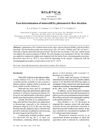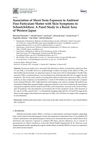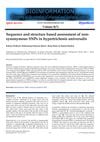 21 citations,
September 1977 in “Journal of Pharmaceutical Sciences”
21 citations,
September 1977 in “Journal of Pharmaceutical Sciences” Minoxidil levels measured in human blood.
 20 citations,
July 1988 in “Clinics in dermatology”
20 citations,
July 1988 in “Clinics in dermatology” Thioglycolate lotions are the most popular method for permanent waving and hair straightening.
 18 citations,
October 2013 in “EFSA Journal”
18 citations,
October 2013 in “EFSA Journal” Coriander seed oil is safe for healthy adults at up to 600 mg per day.
 16 citations,
January 2016 in “Annals of Dermatology”
16 citations,
January 2016 in “Annals of Dermatology” Green tea component EGCG may help prevent hair loss by changing microRNA levels in certain scalp cells.
 14 citations,
June 1952 in “The BMJ”
14 citations,
June 1952 in “The BMJ” Phenobarbitone can cause severe and sometimes fatal skin reactions.
 13 citations,
March 2019 in “Journal of cosmetic dermatology”
13 citations,
March 2019 in “Journal of cosmetic dermatology” Heat damages hair, with Asian hair losing more protein than Caucasian hair.
 13 citations,
December 2013 in “Chemistry Central Journal”
13 citations,
December 2013 in “Chemistry Central Journal” Sunlight exposure increases drug toxicity; amber glass best for protection.
 13 citations,
September 2005 in “Eclética Química”
13 citations,
September 2005 in “Eclética Química” Quick, accurate minoxidil measurement in hair loss products using photometric flow titration.
 12 citations,
August 2017 in “Archives of Pharmacal Research”
12 citations,
August 2017 in “Archives of Pharmacal Research” Lecithin-based microparticles can deliver minoxidil for hair growth effectively with less skin irritation.
 10 citations,
August 2015 in “Journal of biophotonics”
10 citations,
August 2015 in “Journal of biophotonics” Hair follicles help substances penetrate the skin faster and more effectively.
 9 citations,
January 2017 in “Annals of Dermatology”
9 citations,
January 2017 in “Annals of Dermatology” The study found genetic differences related to hair development that may explain hair loss in a patient with Trichorhinophalangeal syndrome type I.
 7 citations,
March 2017 in “International Journal of Environmental Research and Public Health”
7 citations,
March 2017 in “International Journal of Environmental Research and Public Health” Breathing in fine particles or Asian dust short-term doesn't affect schoolchildren's skin symptoms.
 6 citations,
March 2018 in “Journal of Chromatography A”
6 citations,
March 2018 in “Journal of Chromatography A” New method accurately measures finasteride and M3 in urine, helping evaluate pharmacokinetics.
 6 citations,
December 2016 in “Springer eBooks”
6 citations,
December 2016 in “Springer eBooks” Environmental stressors like UV radiation, pollution, and extreme temperatures can damage skin and lead to diseases and aging.
 6 citations,
January 2009 in “Elsevier eBooks”
6 citations,
January 2009 in “Elsevier eBooks” The skin has multiple layers and cells, serves as a protective barrier, helps regulate temperature, enables sensation, affects appearance, and is involved in vitamin D synthesis.
 4 citations,
January 2019 in “Elsevier eBooks”
4 citations,
January 2019 in “Elsevier eBooks” Finding new uses for existing drugs is promising and can lead to safer, more effective medicines.
 3 citations,
April 2012 in “Bioinformation”
3 citations,
April 2012 in “Bioinformation” Two specific SNPs in the TRPS1 gene cause excessive hair growth by altering the protein's structure.
 2 citations,
May 2023 in “bioRxiv (Cold Spring Harbor Laboratory)”
2 citations,
May 2023 in “bioRxiv (Cold Spring Harbor Laboratory)” Sebaceous glands can heal and regenerate after injury using their own stem cells and help from hair follicle cells.
 2 citations,
July 2020 in “Journal of Drug Delivery Science and Technology”
2 citations,
July 2020 in “Journal of Drug Delivery Science and Technology” Created finasteride complex to increase water solubility and drug release.
 2 citations,
January 2019 in “Applied clinical research, clinical trials and regulatory affairs”
2 citations,
January 2019 in “Applied clinical research, clinical trials and regulatory affairs” Different countries have regulations to ensure the safety of hair care products, with some recalling hair straighteners due to high formaldehyde.
 1 citations,
January 2024 in “Theranostics”
1 citations,
January 2024 in “Theranostics” Exosomes show promise for future tissue regeneration.
 1 citations,
August 2023 in “International journal of pharmacy & integrated health sciences”
1 citations,
August 2023 in “International journal of pharmacy & integrated health sciences” Cosmeceuticals are popular for their skin health benefits and anti-aging effects.
 1 citations,
March 2020 in “Current Science”
1 citations,
March 2020 in “Current Science” Most people in the surveyed area experience hair loss, but they are not aware of the role of diet, iron, hormones, genetics, and possibly water quality in causing it.
 1 citations,
January 1996 in “Springer eBooks”
1 citations,
January 1996 in “Springer eBooks” Diet affects baldness; eat balanced, less animal fat, more fruits, vegetables, and cereals.
 April 2024 in “Frontiers in cellular and infection microbiology”
April 2024 in “Frontiers in cellular and infection microbiology” Blue light might help treat skin conditions by affecting the skin's bacteria.

Ayurvedic herbs may reduce side effects and improve effectiveness of cancer treatments.
 March 2024 in “Tropical Journal of Natural Product Research”
March 2024 in “Tropical Journal of Natural Product Research” Many people in Fez-Meknes use potentially toxic plants for various health and cosmetic purposes, but more research is needed to ensure their safety.
 December 2023 in “International Journal of Research in Ayurveda and Pharmacy”
December 2023 in “International Journal of Research in Ayurveda and Pharmacy” Ayurvedic remedies may boost immunity and balance in cancer treatment but need more research.
 November 2023 in “Linköping University medical dissertations”
November 2023 in “Linköping University medical dissertations” Keratinocytes and adipose-derived stem cells can effectively heal difficult skin wounds.

Bee pollen, green tea, essential oils, and various plant extracts improve skin and hair health.






























